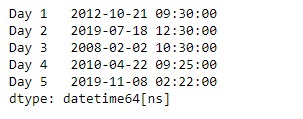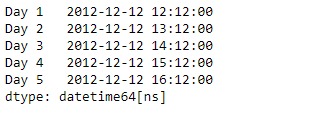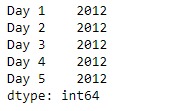Series.dt可用于以datetimelike的形式访问序列的值并返回几个属性。 Pandas Series.dt.year属性返回一个numpy数组,其中包含给定系列对象的基础数据中的datetime年。
用法: Series.dt.year
参数:没有
返回:numpy数组
范例1:采用Series.dt.year属性以在给定Series对象的基础数据中返回日期时间的年份。
# importing pandas as pd
import pandas as pd
# Creating the Series
sr = pd.Series(['2012-10-21 09:30', '2019-7-18 12:30', '2008-02-2 10:30',
'2010-4-22 09:25', '2019-11-8 02:22'])
# Creating the index
idx = ['Day 1', 'Day 2', 'Day 3', 'Day 4', 'Day 5']
# set the index
sr.index = idx
# Convert the underlying data to datetime
sr = pd.to_datetime(sr)
# Print the series
print(sr)输出:

现在我们将使用Series.dt.year属性以在给定Series对象的基础数据中返回日期时间的年份。
# return the year
result = sr.dt.year
# print the result
print(result)输出:

正如我们在输出中看到的,Series.dt.year属性已成功访问并返回给定系列对象的基础数据中日期时间的年份。
范例2:采用Series.dt.year属性以在给定Series对象的基础数据中返回日期时间的年份。
# importing pandas as pd
import pandas as pd
# Creating the Series
sr = pd.Series(pd.date_range('2012-12-12 12:12',
periods = 5, freq = 'H'))
# Creating the index
idx = ['Day 1', 'Day 2', 'Day 3', 'Day 4', 'Day 5']
# set the index
sr.index = idx
# Print the series
print(sr)输出:

现在我们将使用Series.dt.year属性以在给定Series对象的基础数据中返回日期时间的年份。
# return the year
result = sr.dt.year
# print the result
print(result)输出:

正如我们在输出中看到的,Series.dt.year属性已成功访问并返回给定系列对象的基础数据中日期时间的年份。
相关用法
- Python pandas.map()用法及代码示例
- Python Pandas Series.str.len()用法及代码示例
- Python Pandas.factorize()用法及代码示例
- Python Pandas TimedeltaIndex.name用法及代码示例
- Python Pandas dataframe.ne()用法及代码示例
- Python Pandas Series.between()用法及代码示例
- Python Pandas DataFrame.where()用法及代码示例
- Python Pandas Series.add()用法及代码示例
- Python Pandas.pivot_table()用法及代码示例
- Python Pandas Series.mod()用法及代码示例
- Python Pandas Dataframe.at[ ]用法及代码示例
- Python Pandas Dataframe.iat[ ]用法及代码示例
- Python Pandas.pivot()用法及代码示例
- Python Pandas dataframe.mul()用法及代码示例
- Python Pandas.melt()用法及代码示例
注:本文由纯净天空筛选整理自Shubham__Ranjan大神的英文原创作品 Python | Pandas Series.dt.year。非经特殊声明,原始代码版权归原作者所有,本译文未经允许或授权,请勿转载或复制。
